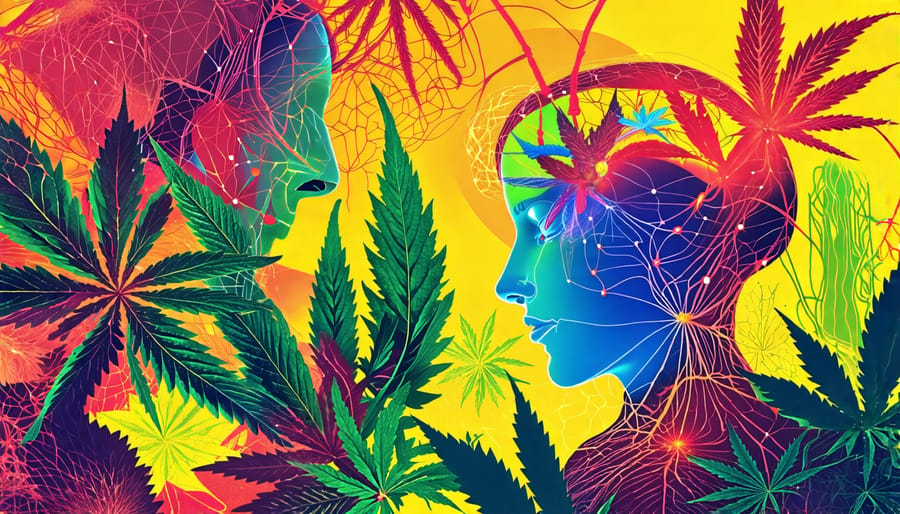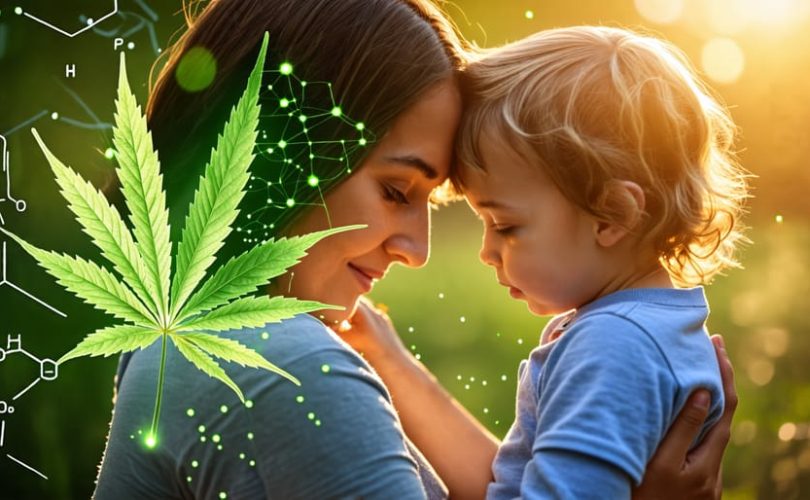Consult with a pediatrician or child psychiatrist to carefully assess whether CBD may be an appropriate option for managing your child’s specific behavioral challenges, considering factors to consider such as your child’s age, medical history, and the severity of their symptoms. Choose high-quality, third-party tested CBD products from reputable sources to ensure purity, potency, and safety for your child’s use. Start with the lowest effective dose and monitor your child’s response closely, adjusting the dosage under medical supervision if needed to optimize benefits while minimizing any potential side effects. Combine CBD use with other evidence-based therapies like behavioral interventions, counseling, or medication as recommended by your child’s healthcare provider for a comprehensive approach to supporting their mental health and well-being.
Understanding Childhood Behavioral Challenges

Causes and Risk Factors
Children’s behavioral issues can stem from a complex interplay of genetic, environmental, and developmental factors. Genetics play a significant role in certain neurodevelopmental disorders, such as autism spectrum disorder (ASD) and attention-deficit/hyperactivity disorder (ADHD). These conditions can manifest as challenging behaviors, including impulsivity, hyperactivity, and difficulty with social interactions. Environmental factors, such as exposure to toxins, maternal stress during pregnancy, and adverse childhood experiences (ACEs), can also contribute to behavioral problems. ACEs, which include abuse, neglect, and household dysfunction, can lead to toxic stress and alter brain development, increasing the risk of emotional and behavioral difficulties. Developmental factors, such as delayed milestones or learning disabilities, can further exacerbate behavioral challenges. It’s essential to recognize that each child’s situation is unique, and a comprehensive evaluation by healthcare professionals is crucial in identifying the underlying causes and developing an appropriate treatment plan. By understanding the complex interplay of these risk factors, parents and caregivers can better support their children’s emotional and behavioral well-being.
Traditional Treatment Options
When addressing children’s behavioral challenges, traditional treatment options typically involve a combination of medication, therapy, and behavioral interventions. Medications, such as stimulants for ADHD or antidepressants for anxiety and depression, can help manage symptoms and improve functioning. However, these medications may come with side effects and may not be suitable for all children.
Therapy, such as cognitive-behavioral therapy (CBT) or family therapy, can help children develop coping skills, improve communication, and address underlying emotional issues. Behavioral interventions, like positive reinforcement and consistent routines, can promote positive behavior and reduce problematic behaviors.
While these conventional approaches can be effective, they may not work for all children, and some parents may seek alternative or complementary options. It’s crucial to work closely with healthcare professionals, such as pediatricians, child psychologists, and psychiatrists, to develop a personalized treatment plan that considers the child’s unique needs and circumstances. By combining various approaches and regularly monitoring progress, parents and professionals can help children manage their behavioral challenges and improve their overall well-being.
What is CBD?
Cannabidiol, or CBD, is a naturally occurring compound found in the Cannabis sativa plant. Unlike its more well-known counterpart, tetrahydrocannabinol (THC), CBD does not produce the “high” associated with marijuana use. CBD is extracted from hemp, a variety of the cannabis plant that contains only trace amounts of THC.
CBD interacts with the body’s endocannabinoid system (ECS), which plays a crucial role in regulating various physiological processes, including mood, sleep, appetite, and immune function. The ECS consists of endocannabinoids (naturally produced by the body), receptors, and enzymes. CBD is believed to help balance and support the ECS, potentially leading to a range of therapeutic benefits.
Research suggests that CBD may have anxiolytic (anti-anxiety), anti-inflammatory, and neuroprotective properties. These properties have led to increased interest in using CBD to help manage various health conditions, including anxiety, sleep disorders, and chronic pain.
It is important to note that while CBD is derived from the cannabis plant, it is not the same as medical marijuana, which contains significant levels of THC and is used to treat specific medical conditions under the guidance of a healthcare professional. CBD products are typically derived from hemp and contain only trace amounts of THC, making them non-intoxicating and legal in many countries and states.
As with any supplement or treatment, it is essential to consult with a qualified healthcare professional before using CBD, especially when considering its use for children. They can help determine whether CBD is appropriate, guide dosage, and monitor for any potential side effects or interactions with other medications.

Potential Benefits of CBD for Children’s Behavior
CBD and ADHD
Attention Deficit Hyperactivity Disorder (ADHD) is a common neurodevelopmental condition that can significantly impact a child’s behavior, focus, and impulse control. While traditional treatments like medication and therapy are often effective, some parents are exploring alternative options like CBD. Research suggests that CBD may offer potential benefits for children with ADHD by interacting with the body’s endocannabinoid system, which plays a role in regulating mood, attention, and behavior.
Several small-scale studies have indicated that CBD may help improve focus, reduce hyperactivity, and promote calmness in children with ADHD. For example, a 2019 study found that a combination of CBD and THC (another compound found in cannabis) led to significant improvements in attention, hyperactivity, and impulsivity in children and adolescents with ADHD. Another study from 2020 suggested that CBD might help regulate the levels of dopamine, a neurotransmitter involved in attention and motivation.
However, it’s essential to note that research on CBD for ADHD is still limited, and more extensive studies are needed to fully understand its potential benefits and long-term effects. Parents considering CBD for their child’s ADHD should always consult with a healthcare professional first to discuss the risks, benefits, and appropriate dosage. They should also ensure that any CBD products they use are high-quality, third-party tested, and free from contaminants. While CBD may offer a promising complementary approach for managing ADHD symptoms, it should not be seen as a replacement for evidence-based treatments recommended by a child’s doctor or mental health provider.
CBD and Autism-Related Behaviors
CBD may offer potential benefits for children with autism spectrum disorder (ASD) who struggle with anxiety, aggression, and other challenging behaviors. Anecdotal reports from parents and some preliminary studies suggest that CBD could help reduce anxiety and promote calmness in children with ASD. The non-psychoactive nature of CBD makes it an appealing option for parents seeking natural ways to support their child’s well-being.
However, it is crucial to note that research on CBD and autism-related behaviors is still limited, and more studies are needed to fully understand its effects and long-term safety in children. While CBD is generally considered safe, it can interact with certain medications and cause side effects such as fatigue or changes in appetite.
If you are considering using CBD to help manage your child’s autism-related behaviors, it is essential to consult with a healthcare professional experienced in both ASD and CBD. They can help you weigh the potential benefits and risks, determine an appropriate dosage, and monitor your child’s progress. Remember, CBD should not be used as a substitute for proven therapies and interventions for ASD, but rather as a complementary tool under medical guidance.
Safety Considerations and Precautions
While CBD has shown potential benefits for children’s behavior, safety is a top priority when considering its use. Parents should be aware of possible side effects, such as drowsiness, dry mouth, and changes in appetite or weight. CBD may also interact with certain medications, so it’s crucial to consult a healthcare provider before starting any CBD regimen.
Choosing high-quality, lab-tested CBD products is essential to ensure safety and effectiveness. Look for products that have been third-party tested for purity, potency, and contaminants. Avoid products with unclear labeling or those making unrealistic health claims.
Dosing is another important consideration when using CBD for children. Starting with a low dose and gradually increasing it under medical supervision is the safest approach. A healthcare provider can help determine the appropriate dosage based on the child’s age, weight, and specific needs.
Long-term effects of CBD use in children are not yet fully understood, as research in this area is still limited. While current studies suggest that CBD is generally well-tolerated, more research is needed to establish its safety profile for extended use in young populations.
It’s important to remember that CBD should not be viewed as a standalone treatment for children’s behavioral issues. A comprehensive approach that includes therapy, educational support, and lifestyle modifications is often most effective. CBD may be used as a complementary tool under the guidance of a knowledgeable healthcare provider who can monitor the child’s progress and adjust the treatment plan as needed.
As with any health decision involving children, open communication between parents, healthcare providers, and educators is key. By working together and staying informed about the latest research on CBD and children’s health, families can make well-informed decisions that prioritize the safety and well-being of their children.
How to Talk to Your Child’s Doctor About CBD
When considering CBD as a potential treatment option for your child’s behavioral challenges, it’s crucial to have an open and honest conversation with their pediatrician or mental health professional. Begin by expressing your concerns about your child’s behavior and your interest in exploring alternative treatments like CBD. Be prepared to discuss your child’s medical history, current medications, and any other relevant information that may help the doctor provide personalized advice.
It’s essential to approach the conversation with an open mind and a willingness to listen to the doctor’s expert opinion. They may have valuable insights into the potential benefits and risks of CBD for your child’s specific situation. Don’t hesitate to ask questions about the current research on CBD, potential side effects, and how it may interact with other medications your child is taking.
As a parent, you are your child’s best advocate, so don’t be afraid to voice your concerns and preferences. However, it’s equally important to trust the expertise of medical professionals and work collaboratively to make informed decisions about your child’s care. If your doctor is not well-versed in CBD or seems dismissive of your interest, consider seeking a second opinion from a healthcare provider with experience in this area.
Remember, the decision to use CBD for your child’s behavior should be made in partnership with their doctor, taking into account your child’s unique needs and medical history. By maintaining open communication and a team-oriented approach, you can ensure that your child receives the most appropriate and effective care for their overall well-being.

Conclusion
As parents navigate the challenges of childhood behavioral issues, it’s essential to remember that a holistic approach is key. While CBD may offer potential benefits, it should be considered as part of a comprehensive treatment plan that addresses the child’s overall well-being. Seeking support from healthcare professionals, therapists, and other parents who have faced similar struggles can provide valuable guidance and reassurance. Staying informed about the latest research and developments in child mental health can empower parents to make well-informed decisions for their children. Ultimately, prioritizing open communication, emotional support, and a nurturing environment is crucial in helping children thrive and overcome behavioral challenges.







